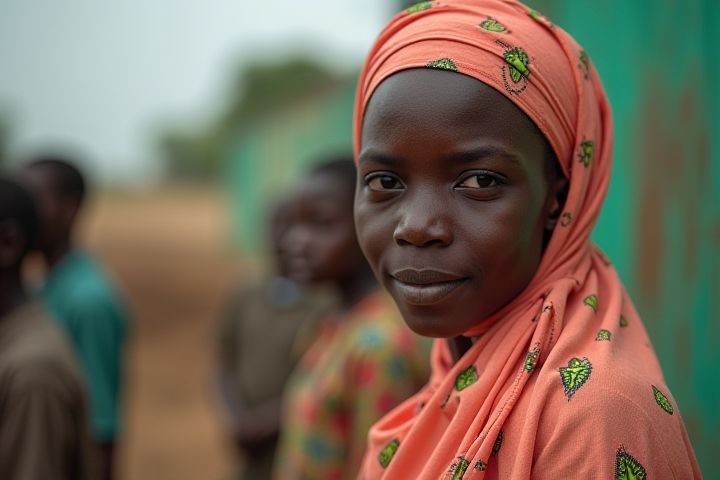
Nigeria's population, exceeding 200 million, positions it as the most populous country in Africa and the seventh globally. The population growth rate stands around 3.2% annually, driven by high fertility rates and a youthful demographic, with over 40% of the population under 15 years old. Urbanization is rapidly increasing, as cities like Lagos and Abuja attract millions seeking better opportunities, contributing to challenges in infrastructure, healthcare, and education. Policies aimed at family planning and educational initiatives for women are crucial in managing this growth. Understanding these dynamics is essential for addressing potential social and economic impacts on Nigeria's future.
High fertility rate
Nigeria's population growth is significantly influenced by its high fertility rate, which stands at approximately 5.4 children per woman, one of the highest globally. This impressive rate is attributed to cultural norms favoring larger families, alongside limited access to education and reproductive health services for women. As a result, Nigeria is projected to become the third most populous country by 2050, challenging infrastructure, healthcare, and education systems. Understanding these dynamics is crucial for policymakers aiming to address the challenges posed by rapid population expansion and foster sustainable development.
Youthful population
Nigeria's population, estimated at over 216 million, features a remarkably youthful demographic, with approximately 60% under the age of 25. This youthful population presents both significant opportunities and challenges for the country's socio-economic development. The burgeoning workforce can drive innovation and economic growth if harnessed effectively, yet it also necessitates substantial investments in education, healthcare, and job creation to prevent high unemployment rates. As Nigeria continues to expand, understanding this youthful demographic's needs and aspirations is crucial for sustainable progress and stability.
Urbanization trends
Nigeria's population growth is significantly influenced by rapid urbanization, with over 50% of its inhabitants now residing in urban areas. Major cities like Lagos and Abuja experience massive influxes of people seeking better economic opportunities, leading to increased demand for housing and services. This urban migration has resulted in sprawling informal settlements, highlighting challenges such as inadequate infrastructure, sanitation issues, and increased traffic congestion. You may find that this trend not only affects living conditions but also impacts social dynamics and economic development across the nation.
Housing challenges
Nigeria's rapid population growth, projected to exceed 400 million by 2050, presents significant housing challenges, particularly in urban areas like Lagos and Abuja. The current housing deficit stands at over 17 million units, exacerbated by inadequate infrastructure, limited access to financing, and high construction costs. As more people migrate to cities in search of better opportunities, overpopulation leads to the proliferation of informal settlements, putting immense pressure on local resources and services. To ensure sustainable development, innovative housing solutions and policies that prioritize affordable housing are essential for meeting the needs of Nigeria's expanding population.
Strain on infrastructure
Nigeria's population growth, projected to reach over 400 million by 2050, places immense strain on the country's already fragile infrastructure. Urban areas like Lagos and Abuja face severe challenges, including inadequate transportation systems, insufficient water supply, and overloaded waste management facilities. The rapid increase in residents escalates demand for housing and essential services, leading to overcrowded slums and heightened poverty levels. To ensure sustainable development, it is crucial for policymakers to invest in resilient infrastructure and effective urban planning that can accommodate the burgeoning population.
Educational needs
Nigeria's population, exceeding 200 million, presents significant challenges and opportunities for its educational system. With a rapidly increasing youth demographic, the demand for quality education escalates, necessitating comprehensive reforms in infrastructural development, teacher training, and curriculum enhancement. Access to education remains uneven, particularly in rural areas, requiring targeted initiatives to improve literacy rates and vocational training. Addressing these educational needs is crucial for harnessing Nigeria's demographic dividend and fostering sustainable economic growth.
Employment pressures
Nigeria's population growth, which reached over 200 million, significantly intensifies employment pressures within the country. This surge creates an urgent need for job opportunities, as the youth demographic comprises a substantial portion of the population, leading to high unemployment rates. The challenge lies in providing adequate vocational training and education to equip the workforce with necessary skills suitable for emerging sectors. Sustainable economic development strategies are essential to alleviate these employment challenges and harness the potential of Nigeria's burgeoning population.
Healthcare demands
Nigeria's rapidly increasing population, projected to exceed 400 million by 2050, strains the country's healthcare system significantly. The need for medical services is heightened, with rising demands for maternal care, vaccinations, and chronic disease management. Resource allocation becomes critical as urban areas experience healthcare shortages, leading to disparities in access and quality of services. Investing in healthcare infrastructure and training healthcare professionals is essential to meet the growing needs of Nigeria's diverse population.
Food security concerns
Nigeria's population growth, projected to surpass 400 million by 2050, poses significant challenges to food security. Rapid urbanization and increasing demand for food strain agricultural resources, highlighting the need for sustainable farming practices. Enhancing agricultural productivity through innovation and technology is crucial in addressing the food supply gap. You can support local agriculture by selecting Nigerian-grown produce, contributing to improved food availability and security.
Migration patterns
Nigeria's population has experienced significant growth, driven largely by both natural increase and migration patterns. Urban areas like Lagos and Abuja attract millions seeking better economic opportunities, resulting in a demographic shift towards cities. Internal migration from rural regions to urban centers reflects this trend, as individuals seek employment in sectors such as oil, technology, and telecommunications. Understanding these migration dynamics is crucial for policymakers aiming to address challenges related to infrastructure, healthcare, and education in rapidly growing cities.
